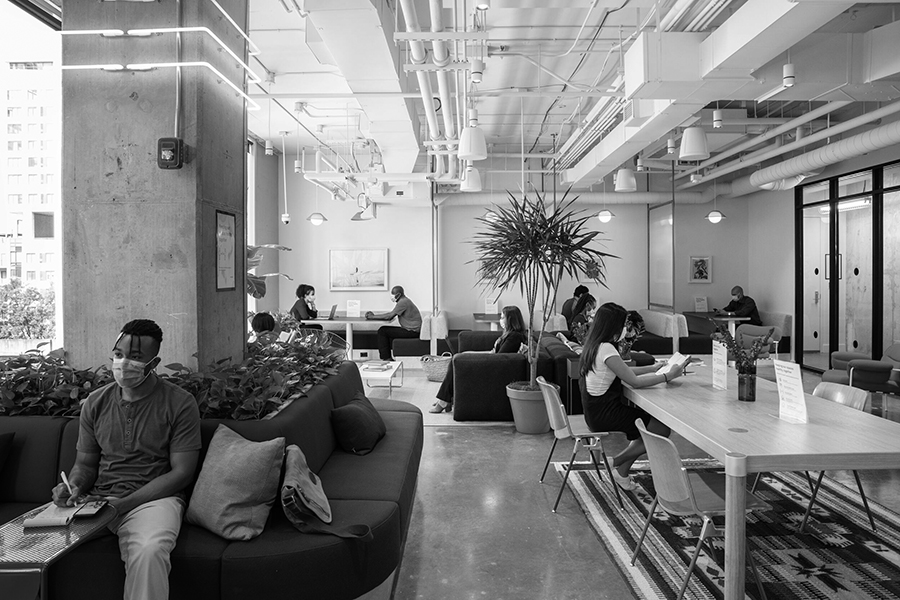The world of work has shifted seismically over the past year and as it continues to evolve, businesses of all sizes are developing new workplace strategies to align with what they believe will work for their company and their employees. Business leaders are reconsidering the purpose of their workspaces and the needs of employees to understand which variation of the hybrid model works best. This has created a lot of uncertainty and many more questions: which model is right for our company? What do we really want from the office? What does success look like in this new era?
While the future of work is certainly not a case of ‘one size fits all’, there are four consistent themes that businesses are exploring and which are now emerging as the defining pillars of the future of work: collaboration, convenience, health and safety, and adaptability. To satisfy employee demand, stay competitive when attracting new talent and improve business performance, business leaders must factor in this new criteria of the workplace, which continues to evolve alongside employee expectations.
Collaboration
While workers might have enjoyed some benefits of home-working through the pandemic and experienced improved flexibility, the question is whether it is sustainable in the long term. As companies rethink the purpose of the office and how they use it, collaboration is key. The ability to collaborate, experience spontaneous interactions and creatively brainstorm is heavily dependent on the physical office. So what should this office look like in order to support successful collaboration and human interaction? It’s become clear that companies should be taking a more adaptable, purpose-led approach to their workspace. For example, moveable soft seating, presentation space and breakout areas to enhance teamwork and create opportunity for spontaneity. Businesses should also look into creating dedicated open-plan spaces that cater to varying work tasks, meet emerging office working styles, and emphasise collaboration and teamwork. By bringing employees together in the office through effective design, companies can create a sense of belonging and a thriving company culture with ease.
Convenience & choice
As hybrid working models gain momentum, working from the office must be a seamless experience for employees and offer more than just desk space. Providing optionality and taking a user-centric approach when creating a ‘future of workplace’ plan is now of the utmost importance. For example, by combining a mix of library-style work areas for focused tasks, and a sociable pantry space which anchors company culture and employee interaction, the office can empower employees with more choice in how they want to use the space. Companies should also look into harnessing technology to make their offices even more convenient and accessible, and explore new ways to provide hospitality services and amenities to enhance the office beyond just a space to work from.
Safety & wellbeing
Following prolonged periods of working from home, it’s vital that as people return to the office, they feel confident doing so. Safety measures and modifications that prioritise personal space and incorporate signage without compromising the design of the office are crucial to instilling this confidence, especially for employees returning to the office for the first time. Flexible space plays an important role in this. Companies should look to partner with industry experts to alter and adapt their office space to accommodate new standards of safety in this era, taking a more holistic approach to cover all bases, and enabling employees to use the space in a way that is both safe and familiar to them. In a landscape where mental and physical wellbeing has become front and centre, and rightly so. Workspace should now foster a culture of employee engagement, wellbeing and safety, which relies heavily on building meaningful connections.
Adaptability
Businesses have faced unprecedented uncertainty over the past 18 months and it has surfaced the significant burden of long-term lease commitments at a time when the needs of the workforce are constantly changing. By utilising more flexible options, business leaders no longer have to plan their workplace needs for the next 15-20 years. Shorter, more flexible leases suit businesses which are still working through the new uncertainty to determine what their long-term real estate strategy looks like. Flexibility also offers alternatives to support businesses of all sizes looking to scale their workspaces in the short term as they adapt and grow. It also adheres to new demand for satellite offices across one or multiple cities to distribute teams, de-densify HQs or provide convenient locations for teams to connect closer to home. As business priorities change, flexible office space is the only viable option for companies to future-proof their business by opting for cost effective, agile real-estate solutions and workplace strategies that can evolve as demand continues to shift.
The pandemic has forced the role of the office to evolve at a much greater speed. Its purpose has become a vital hub for productivity, inspiration and innovation. With the right considerations made and designing workspaces tailored to employee needs, the workplace of the future should enable every employee to perform at their best and collaborate seamlessly with their colleagues in a new hybrid world.








